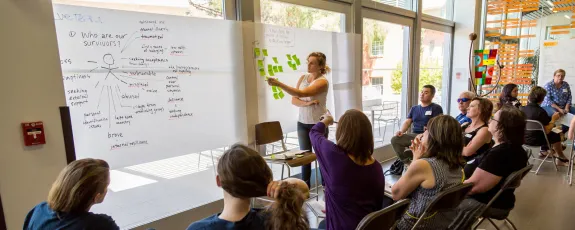
Innovation for Justice
i4J is a virtual social justice innovation lab that creates new, replicable and scalable strategies for legal empowerment.
Housed at both the University of Arizona James E. Rogers College of Law and the University of Utah David Eccles School of Business, Innovation for Justice (i4J) applies design thinking and systems thinking methodologies to expose inequalities in the justice system, and designs, builds and tests disruptive solutions to the justice crisis.
i4J’s Mission: To serve as a catalyst for justice sector transformation that prioritizes increasing access to justice for all.
i4J’s Vision: To build a future where the legal needs and goals of all peoples are met, where justice is realized by a diverse ecosystem of actors, and where legal power is accessible, usable, and shapeable by everyone.
Crossing Boundaries
James E. Rogers College of Law and the University of Utah David Eccles School of Business, Innovation for Justice (i4J) is the nation’s first and only cross-discipline, cross-institution, cross-jurisdiction legal innovation lab. Our research and legal empowerment efforts with and in service of communities across the U.S. positions i4J as an incubator and driver of actionable social change across multiple states.
Reaching Across Silos
As an interdisciplinary community of students, faculty, staff, alumni, partners, and collaborators committed to access to justice, we apply design and systems thinking methodologies to expose inequalities in the justice system and create new, replicable, and scalable strategies for legal empowerment. Our projects cut across traditional human service, legal, and technological sectors to engage system actors from diverse areas of work and life in disrupting the justice crisis.
Challenging the Status Quo
We believe legal knowledge is not the exclusive province of attorneys. We create opportunities for legal advice and assistance to be delivered by trusted community-based advocates with specialized legal training. In reimagining the site and leaders of justice-making, i4J’s work across Impact Areas seeks to democratize legal power by building the bench of individuals who can know, use, and shape the law.
Working with and within the Community
Our participatory action research engages lived experience experts in the community as well as diverse system actors in the nonprofit, government, and private sectors to advance fair and equitable civil justice problem-solving. Recognizing the inherent worth, dignity, and value in community regardless of circumstance, our approach situates systemically disinvested community members as co-researchers who are involved in every step of the research process. In practice and organizational policy, this translates to a commitment to the compensation of and deep respect for the shared time and expertise of co-researchers, co-creators, collaborators, and project partners in our work.Our action-based research engages lived experience experts and diverse stakeholders in the nonprofit, government, and private sectors to advance fair and equitable dispute resolution through systems-level change at both service and policy levels.
Developing Future Changemakers
Our graduate students are prepared to learn and work with and within the community, lead with empathy, check their assumptions, creatively problem-solve, test new ideas, embrace and learn from failure, iterate and co-create solutions, and engage in data-driven decision-making. Pedagogically, this includes a focus on methods of design thinking and systems thinking, confronting bias, and community-centered collaboration in the future of justice work.
Advancing a Human-Centered Justice System
We believe that well-designed, accessible, usable, and useful interventions can mitigate existing access to justice barriers and create a more equitable and simplified justice system. Implementing trauma-informed and trauma-responsive practices among staff, student, and community interactions in designing and building these interventions mitigates the risk of retraumatization when interacting with the justice system. This includes learning about trauma, the associated impacts, and paths to recovery.
i4J focuses on three disruptive strategies - Service, System, and Structure - and applies them to the most urge.
i4J’s Service Impact Areas focus on creating new legal service models so more people can know the law.nt civil legal issues impacting low-income Americans.
i4J’s System Impact Areas focus on improving justice sector technologies so more people can use the law.
i4J’s Structure Impact Areas focus on building tools for policy advocacy so more people can change the law.
i4J serves as a catalyst for justice sector transformation that prioritizes diversity, equity, and inclusion as an essential part of increasing access to justice for all.
i4J prioritizes values of diversity, equity, and inclusion as essential parts of increasing access to justice for all.
In the classroom
We strive to create inclusive and equitable learning environments and to intentionally develop psychological safety in order to make all students feel welcome and valued for their unique contributions. We invite collaboration on classroom norms and values that serve as the north star to the work of the team. We teach vibrant, action-oriented, project-based, community-engaged courses with an explicit expectation that everyone will contribute towards collective excellence. We promote diversity of thought, background, experience, and culture in the classroom because it creates a better classroom community, and because it reinforces the value of diverse perspectives and contributions that drive our research.
In the community
i4J actively works to bridge the justice gap and close the digital divide that disproportionately affects systemically disinvested communities. To bring those who have not had a role in justice decision-making to the table, we work with and within community to conduct research and co-design solutions. Our research teams are trained to recognize how cognitive and implicit biases can impact communication, collaboration, problem-solving, and community-engaged research. Our research teams are also trained in trauma-informed community engagement with emphasis on the agency, resilience, and individuality of the community members we work with. We provide compensation to lived experience experts to respect the value of their time and to acknowledge their valuable contributions to the work.
